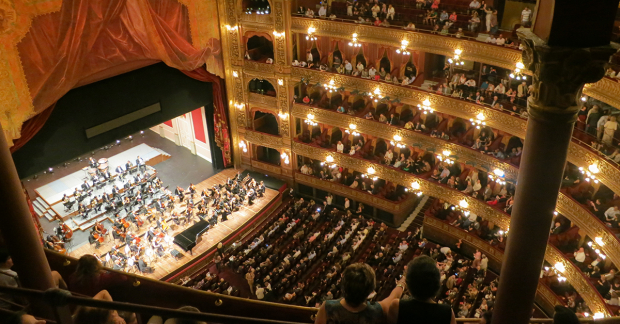Government issues guidance on staging safe performances
The guidance will only apply to outdoor performances for the time being

A new comprehensive guide to staging performances during the pandemic has been released by the UK government.
Applying to England (with separate guidance for Wales, Scotland and Ireland), the brief is broken down into seven parts, covering topics including "who should return to training", "rehearsal and performance", "social distancing in performing arts", "managing performances", and "cleaning objects, equipment and environments".
While indoor performances are currently not permitted (as this will fall under stage four of the Culture Secretary's plan to reopen), this framework will likely apply once those venues can open their doors.
Audiences
Social distancing will remain in place both indoors and out. According to the new rules: "Social interactions should be limited to a group of no more than two households (indoors and out) or up to six people from different households (if outdoors). It will not be against the law for businesses and venues to host large groups, though premises that are not COVID-secure will not be able to house more than 30 people."
Venues are encouraged to lower capacity to at the very least allow for social distancing, with staggered entry times to avoid queues, One-way travel routes will be put in place, while patrons will be told to avoid certain types of transport on their way to shows.
The guidance adds that: "Organisers should ensure that steps are taken to avoid audiences needing to unduly raise their voices to each other. This includes, but is not limited to, refraining from playing music or broadcasts that may encourage shouting, including if played at a volume that makes normal conversation difficult, for example during performance intervals." This is due to the potential risk for transmission.
For audiences, spaces will have to be reconfigured so that audiences are sat rather than standing. Where possible, e-ticketing systems should be used, while refreshments and merchandise should be pre-ordered. It is encouraged that programmes are provided in digital format.
Audiences members are encouraged not to bring bags and coats into auditoria to prevent cluttering.
Audiences will not be permitted onto the stage, or to "touch equipment, props, instruments, set or other objects used by performers". Auditoria will be cleaned between performances, with schedules having to be adjusted to make time for these deep cleans.
Venues
Before venues can reopen, the document says, they will have to introduce brand new cleaning regimes, with "some surfaces cleaned regularly throughout the day". While most air conditioning systems will not need adjusting, venues and buildings are encouraged to use natural ventilation at all times if possible.
Hand sanitiser will need to be provided at "multiple accessible locations", including for wheelchair users. Floor markings and signage will help guide visitors and workers around buildings.
Venues are encouraged to "limit the number of suppliers when hiring equipment", with all equipment cleaned on arrival.
Creatives
For musicians, owners of personal items will have to take responsibility for disinfecting their own personal property, while those will smaller instruments are encouraged to keep them under their seats rather than in communal spaces. Handling of music scores is to be limited to the individual using them, while "dropping off points" will be installed.
The guidance also says that equipment including headsets will have to be dedicated cleaners, making sure they are regularly disinfected if shared between users.
Auditions
Self-taping or online auditions is actively encouraged, and auditionees should try not to arrive ahead of their allocated time slot. Barriers or screens should be placed between actors and casting teams, though always working alongside the needs of disabled and deaf workers.
Rehearsals
Productions are encouraged to rehearse "outdoors where possible" and socially distance those rehearsing. They should also try and "reduce group and cast sizes where possible to maintain social distancing."
Productions should be "mapped out" ahead of in-person rehearsals, with actors encouraged to learn lines in advance.
Performances
As said earlier, for the time being, only outdoor performances are permitted.
Singing in groups or in front of audiences should only be done for work purposes, while singers should have extended social distancing (if face-to-face, actors should be three metres apart) when singing to one another or at audience members / musicians.
Ideally, singing performers should be positioned "side-to-side or back-to-back". Booths, barriers or screens should be used if possible between individual singers.
Productions should limit "wind and brass playing in groups or in front of audiences to professionals" and try and observe extended social distancing (three metres is considered appropriate) between wind and brass players.
The guidance also states that productions should consider "regular private testing (noting that this will not allow any relaxation of other control measures)".
Shows should also "reduce the size of the cast where possible to reduce the number of contact points, for example by reducing numbers of non-essential supernumeraries, players taking dual roles."
Performers will be encouraged to do their own hair and make-up, and "avoid using public transport, aiming to walk, cycle or drive instead."
Face coverings
In the document it is said that: "A face covering can be very simple and may be worn in enclosed spaces where social distancing isn't possible", though also that they are not mandatory, and that "face coverings are not a replacement for the other ways of managing risk, including minimising time spent in contact, using fixed teams and partnering for close-up work, and increasing hand and surface washing."












